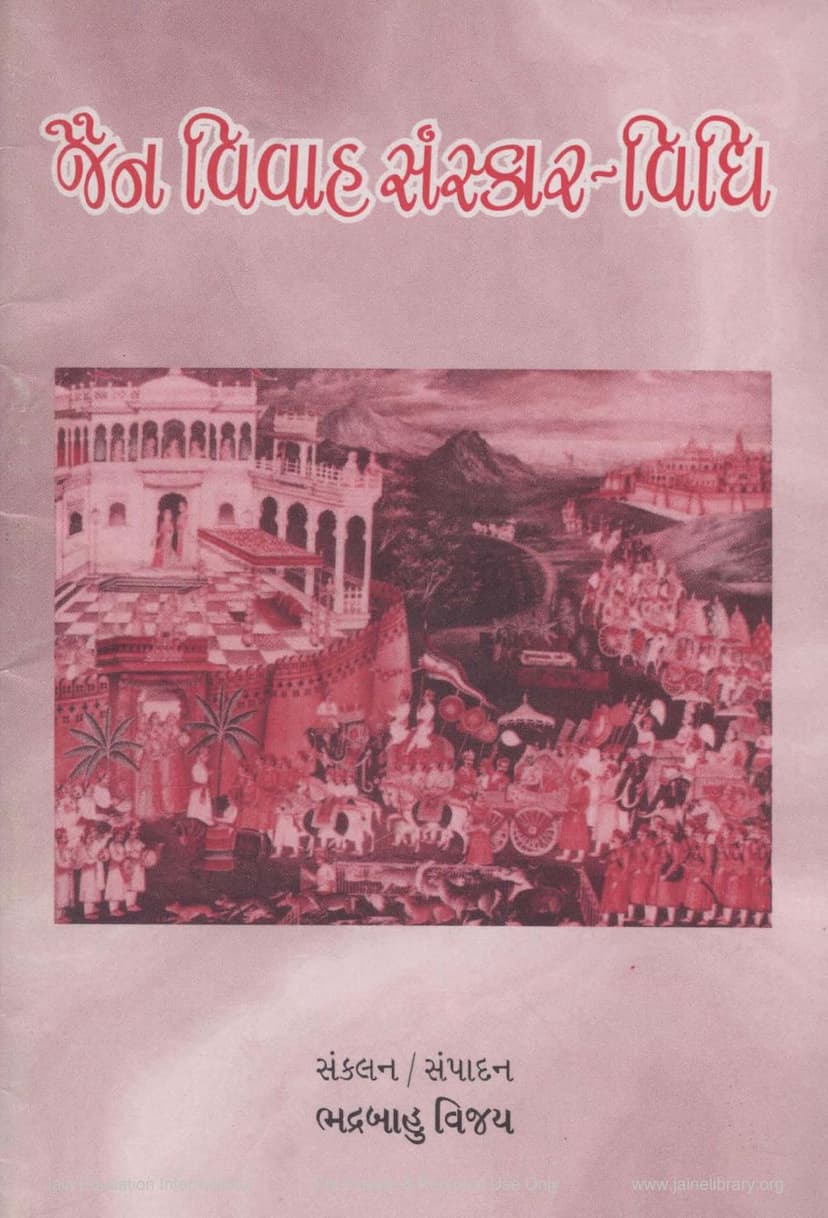Jain Vivah Sanskar Vidhi
Added to library: September 2, 2025

Summary
This document is a detailed guide to the Jain wedding ceremony, titled "Jain Vivah Sanskar Vidhi." It is compiled and edited by Bhadrabahuvijay, with the original source being the "Acharyadinakar Granth" by Acharya Shri Vardhmansuriji, written in Vikram Samvat 1468 (1411 AD). The publisher is Shrutratnakar, Ahmedabad.
The book provides a step-by-step procedure for a traditional Jain wedding, adhering to ancient scriptures and rituals. It includes an example of a wedding invitation (Page 4), outlining the names of the bride and groom, their families, and the auspicious date and time of the ceremony.
The core of the document details the various rituals and their associated mantras, presented in a structured list from Page 6 onwards. These include:
- Mangalacharan (Invocation): Starting with the Namaskar Mantra and a Mangal Shlok, invoking the blessings of the Panch Parmeshthi (Arhants, Siddhas, Acharyas, Upadhyayas, Sadhus).
- Amrut Snan (Nectar Bath): A symbolic purification ritual.
- Atmaraksha (Self-Protection): Protection against negative influences using the Vajrapanjar Stotra.
- Kshetrapal Pujan (Worship of the Guardian Deity of the Land): Honoring the local deity for protection.
- Worship of 24 Tirthankaras (Logassa Sutra): Recitation of verses praising the 24 Tirthankaras.
- Worship of Ganadharas: Honoring the chief disciples of the Tirthankaras.
- Worship of Agam: Reverence for Jain scriptures.
- Kuldavi Pujan (Worship of the Family Deity): Seeking blessings from the ancestral goddess.
- Ashtamatruka Pujan (Worship of the Eight Mother Goddesses): Invoking divine feminine energies.
- Kulkar Pujan (Worship of the Kulkaras): Honoring the lineage of early leaders in Jainism.
- Worship of 24 Yaksha-Yakshinis: Invoking specific celestial attendants of the Tirthankaras.
- Dikpal Pujan (Worship of Directional Guardians): Seeking protection from the deities of the cardinal directions.
- Vidyadevi Pujan (Worship of Goddesses of Knowledge): Honoring divine feminine energies associated with learning.
- Worship of 12 Rashis (Zodiac Signs): Seeking astrological harmony.
- Navagraha Pujan (Worship of the Nine Planets): Seeking celestial favor.
- Nakshatra Pujan (Worship of the 27 Lunar Mansions): Seeking astrological blessings.
- Shanti Mantra: A mantra for peace and well-being.
- Gandharva Vidhi: Ritualistic offerings and decorations.
- Vedi Pratishtha (Installation of the Altar): Consecrating the sacred wedding platform.
- Toran Pratishtha (Installation of the Toran): Adorning the entrance.
- Agni Sthapana (Establishing the Sacred Fire): Setting up the Homa Kund (fire pit).
- Ahuti (Offerings to the Fire): Making oblations with mantras.
- Panigrahan (Joining of Hands): A significant ritual signifying the union.
- Mangalashtak: Chanting eight auspicious verses.
- Abhisinchan (Sprinkling of Blessings): Bestowing blessings.
- Gotrochar (Recitation of Lineage): Announcing the family lineage.
- Granthibandhan (Tying of Knots): Symbolically tying the couple's garments together.
- Phera (Circumambulation): The ritualistic circumambulation of the sacred fire, symbolizing commitment and taking vows. The specific mantras for each of the four rounds focus on overcoming karmas and strengthening the bond.
- Kanyadan (Giving Away the Bride): The formal act of the bride's family entrusting her to the groom.
- Vivah Katha (Wedding Narrative): A discourse or explanation of the significance of the wedding.
- Kar Mochan (Releasing of Hands): A symbolic ritual where the hands are released, but the spiritual connection remains.
- Saat Pratigna (Seven Oaths): The couple makes seven solemn promises for their married life.
- Granthi Mochan (Untying of Knots): Releasing the tied garments.
- Navdampati Dwara Prarthana (Prayer by the Newlyweds): A prayer for spiritual progress and fulfillment.
- Guru Ashirvad (Guru's Blessings): The preceptor offers blessings for prosperity, health, wisdom, and longevity.
- Mangal Kamana (Auspicious Wishes): Prayers for universal peace and well-being.
- Kshama Yachna Visarjan (Seeking Forgiveness and Departure): A ritual of asking for forgiveness for any shortcomings and bidding farewell to the deities invoked.
- Sarva Mangal (Ultimate Auspiciousness): Concluding prayers for overall well-being.
The document also includes a detailed list of materials (Samagri Suchi) required for the ceremony, ranging from religious images and scriptures to various offerings like ghee, rice, flowers, and incense.
In essence, "Jain Vivah Sanskar Vidhi" is a comprehensive manual for conducting a Jain wedding, emphasizing spiritual purity, adherence to scriptural traditions, and the invocation of divine blessings for a harmonious and prosperous married life.